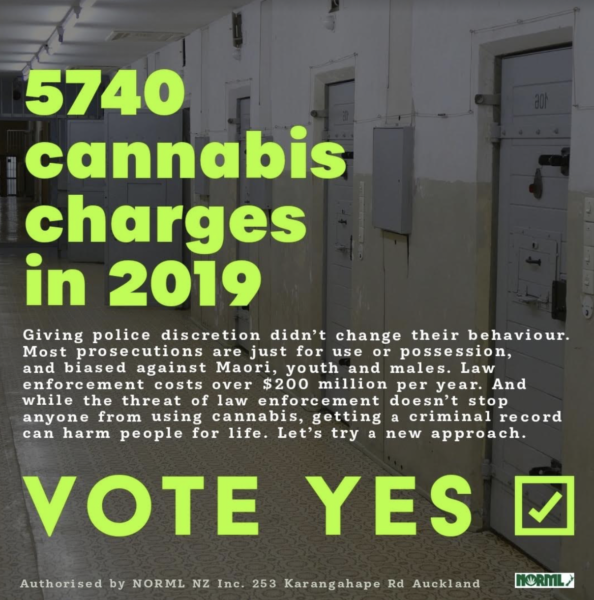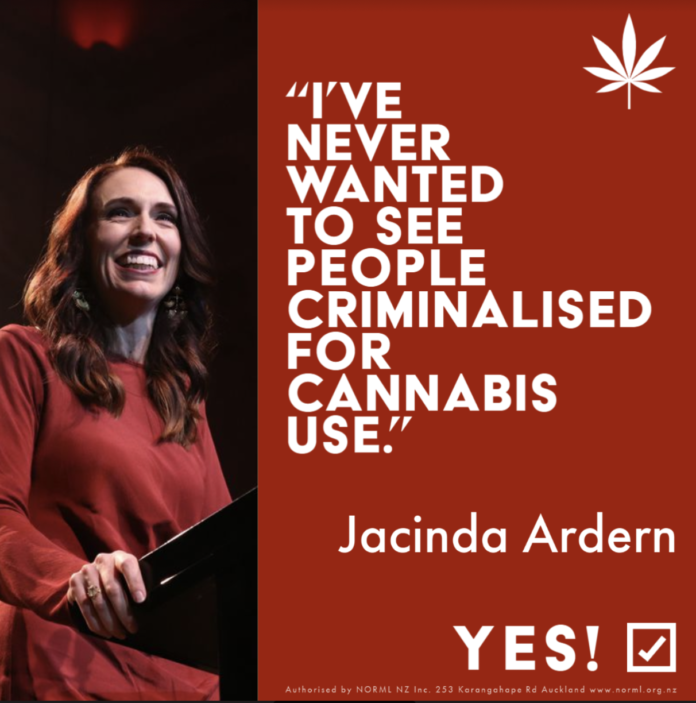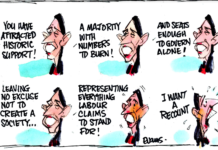While Americans convicted for possessing pot will soon be pardoned, some local politicians have already stubbed out the roach here, citing the 2020 cannabis referendum result. Yet there remains a need to pardon Kiwis for something most of us no longer believe should be a crime, and there are several ways we could do it, writes CHRIS FOWLIE.
As part of a three-point plan, US President Joe Biden announced an immediate and full pardon for everyone in the US federally convicted of “simple possession” of marijuana.
“Sending people to jail for possessing marijuana has upended too many lives — for conduct that is legal in many states. That’s before you address the clear racial disparities around prosecution and conviction. Today, we begin to right these wrongs,” Biden tweeted.
In addition to the pardon of all prior federal convictions, Biden also implored state legislatures and Governors to do the same thing – and that clear signal encouraging local reforms will have a huge impact for millions of Americans carrying state- and county-level convictions for pot.
Today, President Biden pardoned all prior federal and D.C. offenses of simple marijuana possession.@POTUS also called on governors to pardon simple state marijuana possession offenses. pic.twitter.com/PGhVwuruKJ
—The White House (@WhiteHouse) October 6, 2022
The biggest impact could be the third point, which got the fewest headlines: Biden announced plans to review the scheduling of cannabis, which is currently lumped in with Heroin as having “no medical value” and the toughest of sanctions.
Rescheduling cannabis would reduce or potentially eliminate penalties and would help remove blockages to research. Of note, the review does not rule out fully descheduling cannabis, or removing it entirely from the Controlled Substances Act, and leaving states to make their own rules.
Pardon weed?
Statistics from NZ’s Ministry of Justice, quoted by One News, show that between 1980 and 2022 more than 100,000 people have been convicted of cannabis possession and/or use in New Zealand.
The burden of these convictions is not shared evenly. Cannabis is used by people of all walks of life, but the well off and elite have typically avoided police attention and gotten better treatment if they are caught.
On the other hand, according to a recent report by the Prime Minister’s chief science adviser Juliet Gerrard, Māori are three times more likely to be arrested and convicted for cannabis than non-Māori, even after accounting for higher rates of use.
But while welcoming the US move, Justice Minister Kiri Allen said New Zealand’s current laws are “fit for purpose” and the Government is sticking by its pledge to follow the referendum result.
Mōrena @jacindaardern. Even the most ardent opposition to cannabis legalisation through the referendum argued it shouldn’t be a criminal offence. #LetsDoThis.https://t.co/BV02SIwrcF
— Chlöe Swarbrick (@_chloeswarbrick) October6, 2022
Green MP Chlöe Swarbrick said “Even the most ardent opposition to cannabis legalisation argued it shouldn’t be a criminal offence. Now even the birthplace of the “War on Drugs” is admitting they’ve failed.”
Health Minister Andrew Little, former Overseer of the Referendum then tweeted, as an excuse for further inaction. a condescending lesson on New Zealand’s constitutional arrangements.
We don’t have the sort of executive powers that POTUS has. Under our system of government ministers do not interfere in judicial decision-making. Parliament passes laws which judges apply. Parliament has signalled its expectations for how Police exercise charging discretion.
— Andrew Little (@AndrewLittleMP) October 6, 2022
“We don’t have the sort of executive powers that POTUS [President of the United States] has. Under our system of government ministers do not interfere in judicial decision-making. Parliament passes laws which judges apply.”
Well, that’s the point: Parliament has indeed passed laws criminalising hundreds of thousands of people, which the courts are applying and will continue to apply until Parliament does something to change that.
National’s Justice spokesperson Paul Goldsmith tried to end the discussion about pardoning pot convicts by saying cannabis legalisation should be “off the table” because of the referendum result.
ACT’s David Seymour said he voted Yes in the referendum but he’s against pardoning New Zealanders “for something that is still illegal”.
But as Swarbrick said, the “highly specific” referendum’s narrow result (50.7 percent in opposition) should not rule out all progress, especially when even hardened campaigners for Nope admitted people should not be criminalised for using cannabis.
Why, oh Lorde, is Chlöe still the only one making any sense?
Pot pardons could happen here
In the wake of the cannabis referendum, Labour pinned itself to doing nothing. Yet a very narrow vote on a specific piece of legislation should not be an excuse for inaction, for evermore.
The 2019 amendment to the Misuse of Drugs Act. which reminded police of their discretion to not prosecute use and possession “unless it is required in the public interest”. has resulted in much a lower number of arrests. Credit for that.
However, disparities remain including racist enforcement and a geographical bias which sees Aucklanders arrested for cannabis possession at ten times the rate of Southlanders.
Local researchers found that for Māori, “there was no reduction in the number of cannabis charges before vs. after the amendment to cannabis laws”. Recent police researchalso found Māori are still over-represented in cannabis charges despite the 2019 law change giving police discretion over drug-related arrests.
In the New Zealand context, cannabis pardons should cover more than just “simple possession”. People may be convicted under Section 7 of the Misuse of Drugs Act for procuring cannabis, and/or possession, and/or consuming it, smoking it, or otherwise using it. Pardon the lot.
The pardon should also include convictions for cannabis utensils, which carry a heavier sentence and are often recorded on criminal records as “possession of a needle or syringe” – further blighting people’s records and employment prospects.
There are several legal pathways to action a pot pardon.
- Governor General’s prerogative of mercy
The Royal prerogative of mercy could be applied to individual cases, or classes of cases (for example, everyone convicted of possession or use of cannabis and/or a cannabis utensil).
In practise the Governor General acts on the instructions not of the King but of the Government of the day. Cabinet could write to the GG asking them to do this, and with a stroke of their golden pen – voila! – It is done.
- Parliament passes legislation
Legislation could be introduced directing the Ministry of Justice to wipe their records of convictions for possession of cannabis. It could be a Government Bill or a Member’s Bill.
This has been done before. People with convictions for homosexuality are now able to apply to have them wiped. Parliament has also passed legislation to pardon soldiers executed in the Great War.
But cannabis is still illegal, so that wouldn’t help those yet to be convicted in future. A simple fix would be to amend the Misuse of Drugs Act section 7 to specify that offences against it (use and possession etc) shall not be recorded as criminal convictions.
A third legislative method would be to amend the Clean Slate Act so that it applies immediately to any convictions for use or possession of cannabis, rather than the usual 7 years of good behaviour and other criteria.
Local cannabis law reform
Biden implored state legislatures and Governors to wipe criminal records and has cleared a pathway for further law reform at the state level. New Zealand does not have local criminal records that could be wiped, but we can have local drug laws.
The Government could take a leaf from Biden’s book and devolve cannabis law enforcement to a local level. The votes from the cannabis referendum show some areas are more than ready for legalisation, while others have more support for keeping the law the same.
We already have local laws for alcohol. Several regions have voted to retain licensing trusts, and the sale and supply of liquor is quite different in those places. Local Councils have their own Local Alcohol Policies, and Local Approved Product Policies for psychoactive substances.
Aucklanders have their own unique Council structure, an Auckland-only fuel tax, and some may recall when the Auckland Traffic Police performed local enforcement.
So, Auckland Mayor Wayne Brown, I’m looking at you! This is exactly the sort of thing you can do if you want to. Pressure central government for local de jure laws such as the above, or de facto approaches using non-legislative methods.
Local government could negotiate Memorandums of Understanding with their Police district about how they will operate. Such MOUs could detail the priorities expected by that local area (ranking cannabis way down the list), how police are expected to behave, and what it means to serve the public interest in that area.
They could specify that the public interest is not met by searching anyone for cannabis, nor raiding their home for it, nor responding to growing small amounts at home, nor proceeding with any prosecution for personal amounts.
This could become a de facto decriminalisation in areas which showed strong majorities for Yes in the cannabis referendum: the main urban centres, West Auckland, Northland, East Cape, Nelson and the West Coast.
The Māori electorates also all showed strong support for legalisation in the referendum. Could changes to cannabis law enforcement be part of Te Tiriti redresses?
Rescheduling cannabis
Herbal cannabis is currently C1 – the toughest of the Class C subcategories, which come with special police search powers, and restrictions on medical use.
Concentrates made from cannabis, which may include dabs or hash but also cookies and vape cartridges, are classed as B1 which absurdly lumps it in with amphetamine and 25B-NBOMe. Again, B1 comes with tougher restrictions and more police powers.
Rescheduling would mean moving cannabis to lower levels in each class. It would make medical access easier and help curb search powers used to harass and detain tamariki.
It could even mean bringing back the defunct Class D for restricted substances, introduced by Helen Clark’s government but repealed under Key.
Rescheduling is not legalisation or decriminalisation, so even the most miserly interpretation of the cannabis referendum result, say, that taken by Andrew Little, would not be broken by doing this most meagre of moves.
Together with pardoning our cannabis convicts, and being open to local marijuana law reform, descheduling would have a huge impact on New Zealand’s half million regular users, two million canna-curious, and the 100,000 still carrying criminal records for something many of us believe should no longer be a crime.
For parliamentarians considering their legacy, this could be it.

—
Chris Fowlie is the president of the National Organisation for the Reform of Marijuana Laws NZ Inc; developer of the CHOISE model for cannabis social equity; CEO of Zeacann Limited, a cannabis science company; co-founder of the New Zealand Medical Cannabis Council; co-founder of The Hempstore Aotearoa; resident expert for Marijuana Media on 95bFM; cannabis blogger for The Daily Blog, and court-recognised independent expert witness for cannabis. The opinions expressed here are his own.





Fully support this Chris…I wonder if Labour will use this as an election bribe??
So anything they do that actually makes sense between now and the election is a bribe? It won’t happen anyway. Little and Allen are probably as puritanical as a lot the dickheads heads in National
ACT might use it as a bribe though given Rimmers stance is the same as Littles.
Wheel – Okay, how should the Labour Party proceed with this??
Like any and everything else, they’ll need to have various officials undertake several pieces of work in that space, and perhaps get EY to do a template-driven impact study. And if it’s not EY’s turn for a feed on the tit, perhaps Deloitte or who ever else is on the list
Nice one !
@Nathan agree with Chris 100%
Speaking of (midterm) election bribes, wiping historical conviction records will make a difference but as the White House admits, zero people will be released from prison as “there are no individuals currently in federal prison solely for simple possession of marijuana”.
https://www.whitehouse.gov/briefing-room/press-briefings/2022/10/06/background-press-call-on-marijuana-reform/
Tui. That’s a relatively meaningless statement from the PM who also decried child povidy, said that climate change was her generation’s nuclear moment, and was pretty relaxed about Trevor Mallard tormenting protestors down at Parliament. If she pulls off a wedding before the next election she could do ok.
@Applewood Yes, there was a mention of transparency too all wrapped in shiny feel good PR (see MSD child poverty report). Very similar to Tony Blair.
Tui — So sad for Americans to have there hopes dashed again by President Biden
I am still hoping for ACT to pick it up as an election issue and thus forcing the other parties to pull their heads out of their proverbial and get on with it.
lol, ACT are all about being tough on crime, etc. They will jail people for even the slighest offence.
ACT are too slippery, they will say anything to get elected.
Going by their history, they wont represent the common man on this subject, their direction would be only to benefit rich people.
Yes, as Seymour said, we cannot have the poor live in Epsom, it would be degrading.
It would be a good thing to do, but would Andrew Little allow it? And how can we justify criminalizing people today for it. And did the PM know the consequences when she had no ‘opinion’ on Chloe Swarbrucks ill-fated referendum that one could argue the PM did not support.
This PM in 2020
https://www.stuff.co.nz/national/politics/123261775/pm-defends-no-comment-stance-on-cannabis-referendum
“Prime Minister Jacinda Ardern has defended her decision not to share her position on the cannabis referendum during the election, saying she wanted New Zealanders to form their own views.
Ardern voted in favour of legalising cannabis but only disclosed her position after preliminary results for the referendum were released.
“I reject that me allowing New Zealanders to make up their own mind is anything other than allowing people the … freedom of their view,” Ardern said during a Saturday press conference.”
The PM of NZ could have made a world of difference then. By now we could have already changed many things, and yet here we are again discussing something that has been discussed many many times and now NZ rather then being a leader or even just a run of the mill is now lagging behind with no change in sight.
Sadly, our PM had no guts when it would have mattered. Thus there will be no glory with this PM on this issue.
And people will be criminals for growing, harvesting, drying and smoking/eating/otherwise digesting a plant.
Completely agree RB
Well put RB but alas Jacinda Ardern is only interested in votes and doesn’t see this issue as a “biggie.”
Just legalise cannabis. We didn’t have a non binding referendum to shut down the country for elder flu or to send military support to Ukranian nazis. The Labour ruling class could just click their finger and make it happen. Or Labour could just remain a less progressive government than the Americans [smirks].
( Lets see if I get this posted up.I’ll give it one more go.)
The entire recreational drug use debate/debacle/raging storm in a dainty tea cup is embarrassing us all. It’s demeaning and infantile. And the reason I can write that with such confidence is that while we wail and bemoan the evil weed, and other recreational drugs, while we tear our hair out in self righteous indignation at the sight and smell of someone smoking pot, we’re getting drunk from the wine we bought home from the supermarket. I can buy a 13.5% alcohol bottle of wine for less than a 405 gram bottle of mayonnaise.
Why..? I believe it’s about control. Not being allowed to smoke weed but can get drunk [ then sick then die early] from alcohol addiction is permissible. I think it’s a deeply rooted psychological control mechanism to hide a much bigger problem.
Money. Who has it, who earns it and who gets to hoard it.
Once again, we, and our political society, are embroiled in a pathetic attempt by those who fear being discovered muddying the waters to distract us from a frankly obvious situation. In this instance, pot smoking to have us in-fight and argue while our politicians enable four foreign owned banks and our privateer enablers to #A artificially inflate our domestic housing market to use as a money laundering scam and #B dip into the income stream our agrarian exports return to our AO/NZ. There’s so much money coming back to our AO/NZ that someone, somehow must, by any means necessary, launder that money before it’s lent out as mortgage funding, infrastructure capital etc.
( God! I can hear snorts of indignation and old white crooked fucker’s slipper shuffling harrumphing as I write.)
We live in a south pacific veggie garden paradise. We produce foods and wool, timber meats etc. @ Martyn Bradbury occasionally draws reference to our agricultural primary industry reportedly being able to feed 40 million people. Personally, as a farmer, I think it’s at least four times that figure.
There’s only 5.2 million of us. There’s close to 200 K kids living in poverty with their equally impoverished parents. We HAD a world first society with the third highest standard of living in the 19070’s, our historical architecture shows us that money that was around back then. And now? Instead of a fantastic standard of living for us all, we have now nine multi billionaires and four foreign owned banks sporting AO/NZ banners ( ANZ. BNZ and ASB.) Westpac has its tentacle’s up our government, our cops and our courts.
Meanwhile, we’re going all oooo and aaaaah over pot smoking. I mean, wake the fuck up! Wake up? Please, wake up? We’re a hairs breadth away from being re labeled a republic and should that happen, we’re gone. Our AO/NZ will become someone else’s. The Treaty will get ripped up and our taxes-paid-for social welfare systems and infrastructure will become money spinning entities turning over profits for private insurers.
Example:
RNZ.
“New Zealand climber Anna Parsons shares story of horror 80ft Yosemite fall”
“Added to the stress of Parsons’ accident was the fact her travel insurance only covered part of the medical bill, which was expected to be in excess of $1 million.”
Debating re dope smoking is a ruse, a smoke screen. The debate is a red herring to distract from far greater issues. Of sovereignty, of freedom, of our income and our precious way of life. The very last thing it has anything to do with is our well being. [They] don’t give a fuck about us.
The fact the govt let right wing religion spread whatever crap they wanted on cannabis should tell everyone what their true intentions were.
Now watch as they give alcohol a wet bus ticket ride and not proceed with anything put forward.
Recent Jamie Lee Ross saga should highlight how rich people/corporates get their way in our political system.
We’re never going to change anything with this level of corruption in the system.
Criminalising cannabis has not been on any major political agenda for decades now, it is a hassle for politicians and law enforcers too
Andrew Little won’t do a damn thing as usual.
At this point the best option might be to
1. adjust the clean slate legislation as to any custodial sentence for possession of marijuana for personal use.
(where people have been sentenced to prison for possession of marijuana for personal use they are not eligible for clean slate).
Others who did not get such a sentence are already eligible for clean slate after 7 years.
2. allow people convicted since the 2019 amendment to the Misuse of Drugs Act, if they received a non custodial sentence for marijuana possession for personal use, to apply within the 7 year period to have a conviction disregarded.
3. restore the Class D for restricted substances that are possessed for use for medicinal purposes (possibly with specifications on maximum levels of plant THC (to encourage the continuation of the field grown hippie era variety and encourage development of low THC plants for such purposes).
One of the medical varieties on offer is 21% THC, its no different now to what is available on the black market.
Its amazing what a little bit of time does, all that time complaining that THC was causing harm to the community while sneaking it in the backdoor as a medicine. Either its a medicine or its harm to the community, they cant keep this difference going when the only difference is the license some people hold.
It’s the cannabis oil that is used by athletes (to manage recovery) and to manage nausea not the THC.
CBD can decrease pain, inflammation and muscle control problems, as well as improving sleep and appetite, reducing nausea and helping psychoactive disorders.
THC is used more as a medicine than CBD, but I guess you have been sold that story by the govt who wants to try differentiate between the two because up until recently anything THC has been seen to cause harm to communities but now its an accepted pharma medicine I expect their story to change.
I personally have had 10 knee operations starting from the age of 8 right through till present, I use THC because CBD doesnt even touch the sides. Im speaking from experience not from something I was told or read.
IF this government (and any others) are using the results of the referendum as an excuse to be scaredy pants and do nothing about legalizing what clearly should – using any scientific/sociological truth – be legal, then they should be using it correctly. As any analyst would tell you ( or probably most high school math students) 50.7percent vs 48 percent – is statistically closer to split than not. The results also seem to be treated as 50.7 percent of ALL NZ voted no- where it only represents 50.7 % of those who actually VOTED. The assumption could -viably – be stated that those who didn’t vote were neutral, didn’t care either way – not a no vote (and that even the 1.3 percent can’t be use to say NZ is not yet ready for decriminalization and legalization of CBD products at the least). Haven’t seen Portugal or Canada fall over yet….
I have heard stories from users who voted no simply because the legislation they wanted us to swallow was too far over the top to be acceptable to them.The legislation they put forward we were never consulted on, it was a case of either accept it or not. The legislation was so bad it made alcohol look safe by comparison.
Comments are closed.